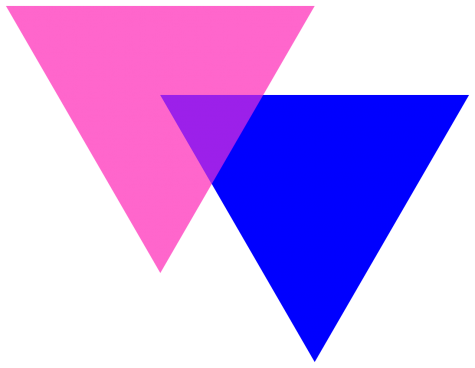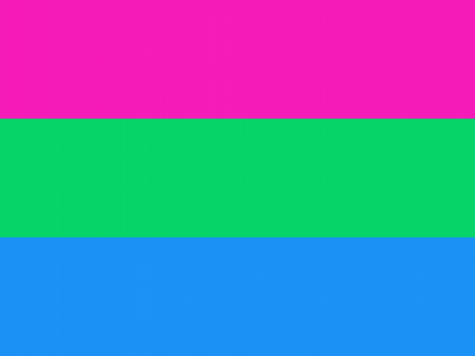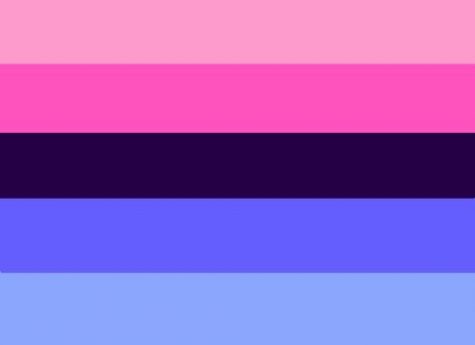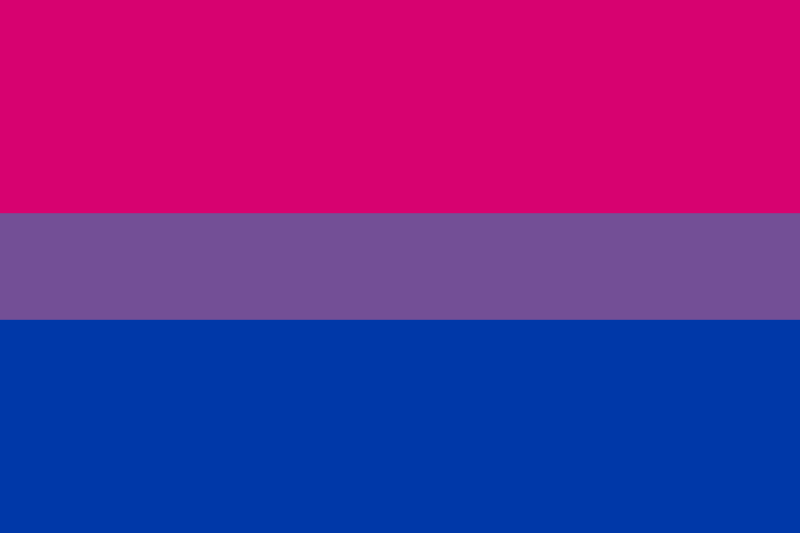Bisexuality- What is it and why Should we Care?
October 10, 2017
Bisexuality. The ‘B’ from LGBT+ and the umbrella term for bisexuals, pansexuals, omnisexuals, polysexuals, and much more. Not many people realize that these terms mean different things, so today I’m going to explain how they are, what they mean, and even have a few people debunk a few myths.

The dictionary definition for bisexual is ‘a person who is sexually attracted to both men and women.’ This is very vague for good reasons: a bisexual person’s attraction toward a gender can vary between people and a bisexual person’s level of attraction toward one sex can change over time. The bisexuality flag is pink (which represents the attraction to one’s sex), purple (which represents the attraction to both sexes), and blue (which represents the attraction to the opposite sex). Another symbol is the ‘biangle.’ This is two overlapping, blue and pink triangles which were adopted because the Nazis forced homosexuals to wear triangles as badges, distinguishing them from Jews and prisoners of war.
You may be thinking, but wouldn’t bisexuality cover all of those sexualities other than lesbian and gay? Isn’t that why it’s an umbrella term? And the answer is no. The reason it’s an umbrella term is because people are unaware of other sexualities like, but not the same as, bisexuality. If you read the definition again, you’ll see that bisexuals are only attracted to males and females, which are only two genders. There are also genderqueer people, which is the umbrella term for agender or neutrois people (having no gender), androgyne people (someone who doesn’t feel as if they fit into any gender), bigender people (have a distinct male and female gender), gender fluid people (moving between genders, but can be both or neither), third gender people (people who identify as a third gender), intersex people (have the physical characteristics of more than one gender), and more.

Polysexuals are quite like bisexuals because they have different attraction levels toward different genders. Polysexuals differ from bisexuals because they can be interested in many different genders, not just two. This doesn’t mean that polysexuals are attracted to all genders; they aren’t. A polysexual could be attracted to men, agender people, intersex people, and gender fluid people, but not any others. The polysexual flag is hot pink, lime green, and blue.

Now, omnisexuals are the least well-known of these terms. They could be interested in any gender but have different levels of attraction to each gender. Usually, the term for omnisexuals and pansexuals are interchangeable and is used all the time, but there are slight differences that cannot go ignored. The omnisexual flag is pink, hot pink, eggplant purple, Majorelle blue, and pale blue.

The term ‘pansexual’ derives from the Greek prefix ‘pan-’, meaning ‘all.’ Pansexuals are commonly called ‘gender blind’ and are not strongly attracted to pans or pancakes. The name just means that they don’t care about gender. Bisexuals on the other hand, usually do care and have different attraction levels for males and females. Pansexuals, like omnisexuals, also can be attracted to any gender. But unlike omnisexuals, pansexuals are, as stated before, ‘gender blind’ and don’t view gender as important when searching for a partner. The pansexual flag is hot pink, yellow, and sky blue. The most common symbol for pansexuality is the letter ‘P’ with distinct traces of the male and female symbols merged together.
But, does this matter? Are LGBT+ people going to be offended if you call them bisexual when they’re really polysexual? To get questions like this answered, I decided to speak to a few people in the LGBT+ community at Blaine:
What is your sexuality?
1: I’m omni.
2: Bisexual.
3: I’m bisexual.
4: I’m pansexual, but even though I’m pan I prefer girls. But I’ll date anyone no matter what they identify as.
5. I’m pan.
When did you realize you were that sexuality?
1: I started thinking I was bisexual when I was in sixth grade. A few of my friends had already come out as bisexual and were very accepting when I came out as well.
2: 6th grade.
3: Halfway through seventh grade, I had a huge crush on someone on one of my sports teams. They later figured it out, but turns out they liked me back.
4: I can’t really remember, but basically I had a long time where I could see myself with a person regardless of their pronouns.
5. About sixth grade.
Have you come out to your friends?
1: I’m very open about my sexuality in school or with my friends and I’ll tell people that I’m omni whenever the subject comes up.
2: Yeah. I just told them, knowing they’d be supportive.
3: Yes. Well, it was to one friend I trusted the most. Then it leaked into my inner circle. Not many people know too much about it even now. A lot of them were proud of me for speaking up and not much has changed, just new ships.
4: Well, most of my friends identify as gay or pan, some even bi and so I just told them. Not all my friends know, only my friends whom I’m close with.
5. I knew most of them accepted it, but when I first came out I was bi. But then I realized I was pan.
Have you come out to your family?
1: No. I don’t really think it matters unless I start going out with a girl or something. I don’t want them to think of me any different. Also, I don’t want them to ban sleepovers or anything out of paranoia because that would seriously suck.
2: Only to my mom. I feel like the rest of my family wouldn’t be as supportive.
3: Yes and my mom was supportive. She just didn’t understand it. She wouldn’t let me hang out with girls anymore so now I just say I realized that I was straight and that I was surrounded by peer pressure and ended up thinking I was. I’m now keeping it a secret because no matter how supportive they are, they seem to be happier now that they think I’m straight. I still love them so much.
4: No… I want to tell them. I really do, but it’s hard for me. The last time I tried talking about my sexuality they lectured me.
5. Yes, my dad and stepmom were totally cool with it, but my mom kept asking me questions like ‘how do you know that?’.
Has anyone ever judged or offended you because of your sexuality?
1: I’m lucky enough to have not have been bullied because of my sexuality, though that is probably due to the fact that that I don’t usually tell people I’m genderfluid and I don’t have many enemies in school.
2: No, because not many people know.
3: No and I hope to God there will never be someone who does. I would be more mad than sad.
4: Yes. They kept asking me a lot of questions that made me uncomfortable. It also made me feel like it’s okay for everyone else to come out as ‘gay’ or ‘bi’ or all that jazz, but I wasn’t allowed to be pan. It still bothers me today.
5. The only thing that’s offending is when people go up to you and say ‘that’s so gay’.
What are some myths you know about your sexuality? What do you think of them?
1: Actually, not enough people really know about omnisexuality to have many myths about it. Though I thought I was bisexual for a while and I heard some things about how it’s supposedly not a real sexuality. I find it terrible that both gay and straight people say things about how bisexuals are ‘just confused’ or ‘experimenting’. We exist!
2: That when people are bisexual, they’re more likely to cheat on their partner, as they like both sexes. I totally disagree. How does a straight woman not cheat on her boyfriend if she finds other guys attractive?
3: Well, for all sexualities I guess it’s that we’re different. That we’re ‘weird and goth and unsociable’. I don’t have any piercings other than two ear piercings. I’ve dyed my hair once because I loved the color. I don’t wear black stuff or swear 24/7. I like guys and girls as a girl but that makes me no different than anyone else.
4: I don’t know any of them.
5. ‘If you’re gay, you’ll go to Hell.’ I don’t believe that because we wouldn’t be made like this if it was wrong.
What’s one thing you want everyone to know about your sexuality?
1: Omnisexuals exist! We’re not pan and we’re not bi. But just because we’re not heterosexual doesn’t mean we should be treated any different than anyone else.
2: It’s a lot more common than you actually think.
3: I guess just that it’s not our fault we’re different and in my case, it’s hard to deal with mentally. Sometimes I’m like ‘Nope, I’m straight, shut up brain’. But then there are times where I’m hopelessly lesbian.
4: Okay, well. For me, and I don’t know if anyone else who’s pan feels this, but one day I feel very straight. The next day I feel hella gay. And then I feel like ‘Ya, man. I’ll date you no matter what you identify as’, but at the end of the day, I know I could date or be with someone no matter who and what they are (gender and sexuality, that is).
5. Pansexual doesn’t mean I’m attracted to pans! It means I’m attracted to all genders!
So, that’s all I have to say about bisexuality. I know everyone has their own beliefs, but you have to remember to think before you speak and that everyone is a person, no matter what their sexuality or gender and deserves to be treated equally and fairly in this world.




Juan • Oct 12, 2017 at 6:06 PM
so exactly HOW MANY genders are there??
Corrine Olson • Oct 15, 2017 at 8:29 PM
That’s a really complicated question. There’s an entire spectrum of genders and not everyone under the same label is alike. I just listed the basics. If you really want to know, dig around the internet a bit.